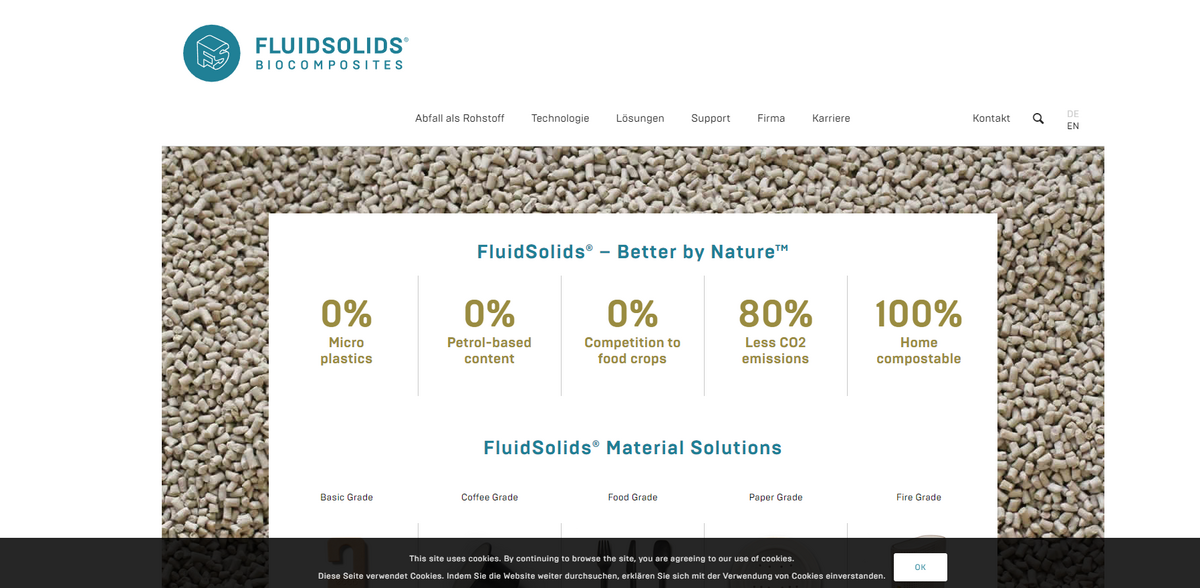What the Project Is
FluidSolids® – BETTER BY NATURE™ is a revolutionary platform that turns waste into a valuable resource. It is not just an idea but a concrete solution that exemplifies the radical implementation of the circular economy. FluidSolids technology utilizes waste streams to produce innovative biocomposites—completely shifting the paradigm of material production. This unique approach replaces conventional petroleum-based plastics with biodegradable biocomposites that not only reduce environmental impact but also open up exciting new business fields. The concept is simple yet profound… turning what many consider waste into materials that work for the planet.
Main Benefit
FluidSolids offers several key benefits that stand out in today’s competitive market, and the advantages speak for themselves:
- 0% Petrol-based content
- 0% Micro plastics
- 0% Competition to food crops
- 80% Less CO2 emissions
- 100% Biobased
- 100% Home compostable
- 100% Recyclable
These figures are not just numbers; they represent a leap forward in sustainable design and functionality—highlighting FluidSolids’ pioneering approach in reducing the environmental footprint while seamlessly meeting the demands of modern legislation and practical market needs.
Innovative Biocomposites Derived from Organic Waste
At the heart of FluidSolids lies an innovative use of organic waste. One of the standout features of the project is the creation of biocomposites based on hazelnut shells. As stated in a research study, “Our study shows that the biocomposites from FluidSolids perform significantly better in terms of overall environmental impact compared to conventional plastics and wood-plastic composites.” It is meaningful that industry experts, such as Martin Lehmann, the Project Manager Consulting and Solutions at myclimate, endorse the exceptional performance and sustainability credentials of these biocomposites. The approach exemplifies a practical application of environmental principles, where each step reflects a commitment to reducing waste while achieving superior product quality.
Recycling Instead of Disposal
FluidSolids redefines the recycling narrative by ensuring that every resource receives a second chance. Instead of treating waste as something to be discarded, the FluidSolids platform reshapes it into high-quality biocomposites. An additional cycle with residues transforms by-products into even more useful material, making the production process not only sustainable but also highly efficient. The technology guarantees that waste streams are continuously reinvigorated as new resources, providing a reliable and long-term solution for industries eager to adopt more environmentally friendly practices. This transformative recycling approach is a breath of fresh air in a world struggling with overburdened landfills and escalating environmental concerns.
Sustainable Technology Solutions for Various Applications
The proprietary FluidSolids technology is the first solution on the market that is capable of mass-producing parts entirely made from biomass. It stands as a testament to the innovative spirit of sustainable technology solutions. The home compostable composites produced using this method exhibit exceptional mechanical and ecological properties. FluidSolids biocomposites are ideal for countless applications, offering outstanding performance while being fully aligned with the vision of reducing plastic pollution and global warming. Their versatility helps industries meet both current market needs and the challenges of future environmental legislation, making this technology a true game changer in material science.
Driving Innovation for a Greener Future
FluidSolids addresses three major global challenges: climate change, waste reduction, and the competition for land use with food production. This dynamic approach combines ecological responsibility with industrial innovation and opens a door to a future where environmental preservation and commercial success go hand in hand. By upcycling organic waste into industrial performance materials, the technology not only fights plastic pollution but also proactively contributes to mitigating global warming. The process is a fine mixture of smart design, natural efficiency, and forward-thinking business practice—a true celebration of nature’s potential to solve modern problems.
Project Impact
- SDG 2: Zero Hunger – By not competing for food crops, the technology ensures that valuable agricultural resources remain available for food production.
- SDG 12: Responsible Consumption and Production – The full lifecycle approach of FluidSolids promotes sustainable production practices and minimizes waste.
- SDG 13: Climate Action – With an impressive reduction in CO2 emissions and a focus on eco-friendly materials, the project actively contributes to climate change mitigation.
FluidSolids in the Media
FluidSolids AG proudly communicates its breakthrough solutions from Zürich, Switzerland. Located at Hohlstrasse 408 in 8048 Zürich, the organization is accessible at +41 444 00 55 00 or via email at info@fluidsolids.com. The media presence of FluidSolids amplifies its commitment to sustainable technology, offering clear and transparent communication to inspired industries and environmental enthusiasts alike. Contacts, news releases, and additional information about the project are readily available, ensuring that every stakeholder remains informed about the innovative progress toward better, nature-friendly materials.


















